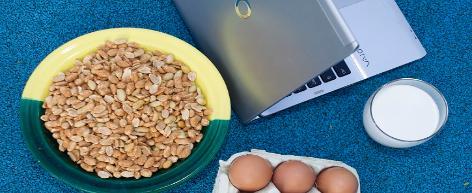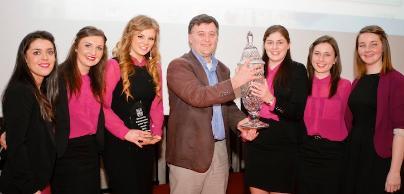12.09.12
Food Science Degree Approved by IFT
University College Cork’s School of Food and Nutritional Sciences has the pleasure to announce that the BSc (Food Science) programme has just been approved by the US-based Institute of Food Technologists. This is the first European Food Science programme with an IFT approval.
Both programmes (Nutrition, and now Food Science) are now accredited/approved by a highly professional body and in both cases UCC was the first outside the accrediting body’s region to gain accreditation/approval (UK for Nutrition, US for Food Science).
More information on IFT approved courses can be found at IFT.org
28.03.2013
UCC Participates in the Worlds Largest Food Allergy Study

University College Cork (UCC) will participate in the world's largest study of food allergies ever undertaken which is being launched in the UK this week.
The €9 million EU funded project will involve the world’s leading experts in Ireland, the UK, Europe, Australia and US and builds on a previous €14.3 million research study.
Up to 20 million European citizens suffer from food allergy. However management of food allergy by patients and health practitioners, and allergens by industry, is hampered by lack of evidence either to prevent food allergy developing or to protect adequately those who are already allergic. European Commission-sponsored research, known as the Integrated Approaches to Food Allergen and Allergy Risk Management (iFAAM), will produce a standardised management process for companies involved in food manufacturing. It will also develop tools designed to enforce these regulations and produce evidence-based knowledge to inform new health advice on nutrition for pregnant women, babies and allergy sufferers.
UCC Professor Jonathan Hourihane, Paediatrics and Child Health, is joined by Dr Mairéad Kiely, Food and Nutritional Sciences, UCC and Dr Audrey Dunngalvin, School of Applied Psychology, UCC for the Irish part of the study. The UCC contribution will integrate the information of Ireland’s first birth cohort study (Baseline)* with nine birth cohorts from a previous EU funded Europrevall study. The follow-up of nearly 14,000 children aged 5-7 years is the biggest such study ever undertaken and hopes to determine how allergies and asthma evolve from infancy to early childhood. The study will look at early life influences such as genetics, infant nutrition and environmental influences such as antibiotic use, pet ownership, stress etc.
UCC will also develop an on-line interface/app to collect real-time information from people having allergic reactions in the community. This will be carried out in conjunction with Anaphylaxis Ireland and health informatics partners in the University of Manchester. A web-based portal called Allerg-e-lab is being developed to match patient inputs with analytical methods to study why and how such reactions put people at risk of anaphylaxis and possibly even death. The developmental phase will try to integrate perspectives from clinicians, the food industry, support groups and consumers. The researchers will identify issues (biological, psychological and social) that must be addressed to develop harmonised approaches and strategies that actually work.
Finally, UCC will lead work in food-challenge studies of volunteers on validating the lowest doses of food to which allergic people react. This is being done to bring clarity to the vexed issue of “may contain” labels, which “are the bane of the lives of consumers with food allergies,” says Professor Hourihane.
He continues: “These labels are not trusted by consumers with allergies and I have even found such a label saying “may contain peanut” on a bottle of own-brand mineral water in a prominent supermarket in Ireland! People with allergies demand better information on this issue and one way to provide this is to study the responses of food allergic subjects to very low doses of the allergens under controlled study conditions.
Regina Cahill, of Anaphylaxis Ireland, believes that better labelling would benefit consumers. She says: “Careful scrutiny of food labels is an essential part of daily life for food allergic individuals and their families. The widespread use of ‘may contain...’ statements is both frustrating and limiting for consumers with allergies. This type of precautionary statement can often leave consumers wondering if the product is likely to contain the allergen mentioned and can lead to risk-taking. The development of safe allergen thresholds would give the food industry guidelines to work within and would hopefully lead to a welcome reduction in the use of 'May contain...' statements." Dr GunnGalvin emphasises that "uncertainty is a core theme in living and coping with food allergy and current risk hazard approaches perpetuate this uncertainty."
Professor Clare Mills, from the Allergy and Respiratory Centre of The University of Manchester's Institute of Inflammation and Repair and based in the Manchester Institute of Biotechnology, will head the study. Professor Mills said: "This is a massive research project which will have far reaching consequences for consumers and food producers. The evidence base and tools that result from this will support more transparent precautionary “may contain” labelling of allergens in foods which will make life easier for allergy sufferers as they try to avoid problem foods.”
The Manchester team will work with 38 partners including, industrial stakeholders (represented by Unilever and Eurofins), patient groups representing people at risk of severe allergic reactions from Germany, UK and Ireland and a risk manager and assessor group including the UK Food Standards Agency. The project will work loosely with the clinical community, working in collaboration with the European Academy of Allergy and Clinical Immunology.
There is currently a list of foods that includes milk, egg, peanuts, soya, wheat, tree nuts, mustard, lupin, fish, crustacean and molluscan shell fish and celery that are considered responsible for triggering the majority of allergies across the world. These foods have to be labeled, irrespective of the level at which they are included, in a recipe. However, management of food allergens that accidently find their way into foods which might otherwise be free of allergen, for example through the use of common processing equipment, remains problematic and often gives rise to precautionary “may contain” labels.
New risk models will be built on pre-existing clinical data sets to support management of these allergens in a factory environment to minimise the use of such labels. Other researchers will look at tools to measure allergens in food to allow validation and monitoring of allergen management plans. Other strands of the project will seek to predict who is likely to suffer a severe reaction, identify whether early introduction of allergenic foods and other nutritional factors may be protective against development of allergies later on in life.
The research project, which is expected to take three years to complete, will also work with groups of babies and groups of children who have been followed from birth in a number of countries including Ireland to look at allergy and give advice on diet in pregnancy and early life.
Notes:
*BASELINE was funded by the National Children’s Research Centre in Dublin
The €9million study builds on the work of the €14million EuroPrevall Project headed by Professor Mills which involved 62 partners from 17 countries.
iFAAM involves 38 partners who include: AMC, Anaphylaxis Ireland, Charite, FARRP, BOKU, ACHR, DAAB, Unilever, SERMAS, TNO, UCC, PEI, DLO-FBR, ILSI, USOU, UoA, UZH, MUL, ACP, LUH, OUH, SCH, DTU, INRA-CRJJ, Leatherhead, Eurofins, JRC, INDOOR, ANSES, Hylo, MoniQA, FLI, EuroFir, KCL, Nestec, ACUK.
26.03.2013
Hungry for Success
A team of Food Science and Food Marketing and Entrepreneurship students hungry for success have won the UCC Entrepreneur of the Year Award 2013.
Their product, Rooties, a tasty root vegetable crisp snack which wowed the judges, secured Rebecca Geaney (Whitechurch), Cáit Lynch (Castleisland), Maeve O’Mahony (Carrigaline), Muireann Lynch (Skibbereen) Breffney O'Dowling-Keane (Blackrock) and Teresa Daly (Kanturk) €5,000 in prize money.

Other winners on the menu included ‘You’ Yogurt, Optodose, RunSmart and Silver Marks, all of who received prized money for their efforts, equalling a total prize pot of €10,000 towards further enhancing an entrepreneurial culture within UCC.
Rooties bucks the trend usually associated with crisps as its main ingredient is root vegetables containing little fat and fortified with protein. The unique manufacturing process ensures the integrity and goodness of the vegetables is maintained while the absorbed protein acts as a barrier and protects the crisp-like texture. Green flecks from the Onion Bhaji flavouring not only add a unique taste, but also visually enhance the crisps. The team was supervised by Prof. Yrjo Roos (School of Food & Nutritional Sciences, UCC) and Dr Joe Bogue (Food Business and Development, UCC).
Professor Anita Maguire, VP for Research and Innovation, UCC, in opening the Award ceremony commented: “The strength of research in UCC is clearly evident
in the award finalists, where many teams demonstrate technical know-how emerging from UCC’s research excellence. This event is an example of partnering, where the student society, relevant academic staff, in conjunction with regional agencies, portrays UCC in the best possible light and profiles the outstanding work of our students in an integrated manner”.
The Awards are coordinated by the UCC Entrepreneurial and Social Society (E&S), the College of Business and Law, IGNITE (UCC's Graduate Business Innovation Incubation Centre) and the Office of the Vice President for Research and Innovation.
In presenting the overall award to the ‘Rooties’ team, Sean O’Sullivan, CEO of Cork County Enterprise Board complimented the award winners, remarking: “They had an exceptional product in concept, look and taste along with an innovative food technology process, with a range of flavours in planning. ‘Rooties’ are a strong team with a clearly thought out route to market and realistic marketing strategies”.
The Chairman of the external adjudication panel, Enda McDonnell, Regional Director of Enterprise Ireland, complimented the “diversity of business opportunities, many of which have the potential to develop into global companies”. Graham Healy, Client Sales Director, Accenture "was very impressed with the confidence, professionalism and detailed knowledge demonstrated by each of the finalists. Their entrepreneurship, allied to their specialist skills and business acumen, bode well for the future of Irish business". Mary Byrne (CEO, Statistical Solutions) also served on the assessment panel.
Tom Dunton, Auditor of the UCC Entrepreneurial and Social Society, acknowledged the generous sponsorship of Bank of Ireland, Accenture, the Cork City & County Enterprise Boards, the College of Business and Law at UCC and Enterprise Ireland. The student society auditor also recognised the help that the society received from Dr Brian O’Flaherty, BIS, UCC.

